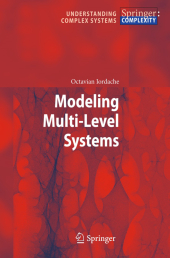 Neuerscheinungen 2014Stand: 2020-02-01 |
Schnellsuche
ISBN/Stichwort/Autor
|
Herderstraße 10
10625 Berlin
Tel.: 030 315 714 16
Fax 030 315 714 14
info@buchspektrum.de |

Octavian Iordache
Modeling Multi-Level Systems
2011. 2014. xv, 232 S. 235 mm
Verlag/Jahr: SPRINGER, BERLIN; SPRINGER BERLIN HEIDELBERG 2014
ISBN: 3-642-42368-X (364242368X)
Neue ISBN: 978-3-642-42368-0 (9783642423680)
Preis und Lieferzeit: Bitte klicken
This book offers broad coverage of a challenging new domain for engineers, researchers and entrepreneurs who are negotiating the transition from learning and adaptability to evolvability and autonomy for technologies, devices and problem-solving methods.
This book is devoted to modeling of multi-level complex systems, a challenging domain for engineers, researchers and entrepreneurs, confronted with the transition from learning and adaptability to evolvability and autonomy for technologies, devices and problem solving methods. Chapter 1 introduces the multi-scale and multi-level systems and highlights their presence in different domains of science and technology. Methodologies as, random systems, non-Archimedean analysis, category theory and specific techniques as model categorification and integrative closure, are presented in chapter 2. Chapters 3 and 4 describe polystochastic models, PSM, and their developments. Categorical formulation of integrative closure offers the general PSM framework which serves as a flexible guideline for a large variety of multi-level modeling problems.
Focusing on chemical engineering, pharmaceutical and environmental case studies, the chapters 5 to 8 analyze mixing, turbulent dispersion and entropy production for multi-scale systems. Taking inspiration from systems sciences, chapters 9 to 11 highlight multi-level modeling potentialities in formal concept analysis, existential graphs and evolvable designs of experiments. Case studies refer to separation flow-sheets, pharmaceutical pipeline, drug design and development, reliability management systems, security and failure analysis. Perspectives and integrative points of view are discussed in chapter 12. Autonomous and viable systems, multi-agents, organic and autonomic computing, multi-level informational systems, are revealed as promising domains for future applications.
Written for: engineers, researchers, entrepreneurs and students in chemical, pharmaceutical, environmental and systems sciences engineering, and for applied mathematicians.
Introduction.- Methodological Resources.- Conventional PSM frames.- New PSM frames.- Mixing in chemical reactors.- Compartmental systems.- Turbulent mixing.- Entropy.- Formal concept analysis.- Existential graphs.- Evolvable designs of experiments.- Autonomous systems perspective.


